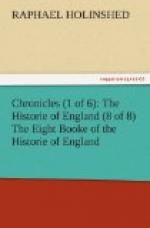* * * * *
Edward earle of Northumberland discomfiteth Mackbeth the usurper of the Scotish kingdome and placeth Malcolme in the same, a controuersie whether Siward were at this discomfiture or no; his stout words when he heard that one of his sonnes was slaine in the field, bishop Aldred is sent to fetch home Edward the sonne of K. Edmund Ironside into England; earle Algar being banished ioineth with the Welshmen against the English and Normans, and getteth the victorie; Harold the son of earle Goodwine putteth earle Algar & his retinue to their shifts by pursute, pacification betweene the generals of both armies, their hosts, Siward earle of Northumberland dieth; his giantlike stature, his couragious heart at the time of his deceasse, why Tostie one of Goodwins sonnes succeeded him in the earledome.
THE FIFT CHAPTER.
[Sidenote: Matth. West. 1054. Hector Boet.] About the thirteenth yeare of king Edward his reigne (as some write) or rather about the nineteenth or twentith yeare, as should appeare by the Scotish writers, Siward the noble earle of Northumberland with a great power of horssemen went into Scotland, and in battell put to flight Mackbeth that had vsurped the crowne of Scotland, and that doone, placed Malcolme surnamed Camoir, the sonne of Duncane, sometime king of Scotland, in the gouernement of that realme, who afterward slue the said Mackbeth, and then reigned in [Sidenote: Simon Dun. M. West.] quiet. Some of our English writers say, that this Malcolme was king of Cumberland, but other report him to be sonne to the king of Cumberland. But heere is to be noted; that if Mackbeth reigned till the yeare 1061, and was then slaine by Malcolme, earle Siward was not at that battell; for as our writers doo testifie, he died in the yeare 1055, which was in the yeare next after (as the same writers affirme) that he vanquished Mackbeth in fight, and slue manie thousands of Scots, and all those Normans which (as ye haue heard) were withdrawen into Scotland, when they were driuen out of England.
It is recorded also, that in the foresaid battell, in which earle Siward vanquished the Scots, one of Siwards sonnes chanced to be slaine, whereof although the father had good cause to be sorowfull, yet when he heard that he died of a wound which he had receiued in fighting stoutlie in the forepart of his bodie, and that with his face towards the enimie, he greatlie reioised thereat, to heare that he died so manfullie. But here is to be noted, that not now, but a little before (as Henrie Hunt. saith) that earle Siward went into Scotland himselfe in person, he sent his sonne with an armie to conquere the land, whose hap was there to be slaine: and when his father heard the newes, he demanded whether he receiued the wound whereof he died, in the forepart of the bodie, or in the hinder part: and when it was told him that he receiued in the forepart; “I reioise (saith he) euen with all my heart, for I would not wish either to my sonne nor to my selfe any other kind of death.”




